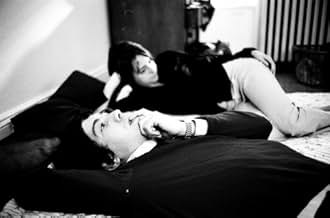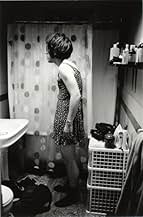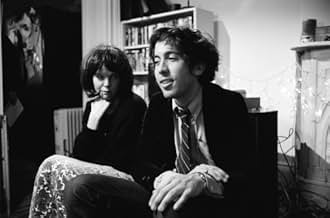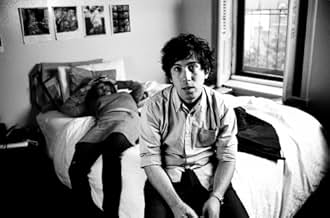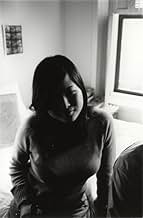IMDb-BEWERTUNG
6,7/10
2017
IHRE BEWERTUNG
Füge eine Handlung in deiner Sprache hinzuAlan is a musician who leaves a busted-up band for New York, and a new musical voyage. He tries to stay focused and fends off all manner of distractions, including the attraction to his good... Alles lesenAlan is a musician who leaves a busted-up band for New York, and a new musical voyage. He tries to stay focused and fends off all manner of distractions, including the attraction to his good friend's girlfriend.Alan is a musician who leaves a busted-up band for New York, and a new musical voyage. He tries to stay focused and fends off all manner of distractions, including the attraction to his good friend's girlfriend.
- Auszeichnungen
- 2 Gewinne & 3 Nominierungen insgesamt
Empfohlene Bewertungen
Without condemning the whole mumblecore movement, I think I sympathise more with its critics than its fans. The films certainly convey relationships between their characters realistically, and there are some scenes in each mumblecore film I've seen which I could almost recognise for myself, but I'm always overwhelmed by this slightly smug self-awareness that pervades many artists working under the 'indie' banner. It is easy to believe that the makers of these films are very similar to their characters young, confused, directionless but the fact that the focus most often falls on the progeny of the last bourgeois generation takes away the integrity of this gritty, frugal filming style.
Mutual Appreciation is as much a milestone of indie film-making as it is a victim of its own pretences. The observer paradox seems to pervade much of the dialogue, much of which feels calculatingly awkward it is easy to distinguish between the improvised lines and premeditated lines. Having said that, I was struck by one scene where Alan is besieged by with women at a 'party' he wasn't certain about going to in the first place, and is eventually convinced to don a dress and make-up. Here it seems the actors were given the most room to ad-lib, and it's a brilliant piece of footage which seems to speak to the majority of young adults and their issues with projecting identity.
Mutual Appreciation is as much a milestone of indie film-making as it is a victim of its own pretences. The observer paradox seems to pervade much of the dialogue, much of which feels calculatingly awkward it is easy to distinguish between the improvised lines and premeditated lines. Having said that, I was struck by one scene where Alan is besieged by with women at a 'party' he wasn't certain about going to in the first place, and is eventually convinced to don a dress and make-up. Here it seems the actors were given the most room to ad-lib, and it's a brilliant piece of footage which seems to speak to the majority of young adults and their issues with projecting identity.
Painful awkwardness
it's a real problem. Bujalski masterfully uncovers a new generation of college graduates that probably seems all too familiar to some. The film captures moments of social anxiety that come from a generation of sheltered upper middle class graduates. The security of a sheltered life comes with a price: these people have no idea how to express emotions and talk about anything beyond mundane daily happenings unless, as Ellie says, they are fed multiple beers. When Ellie and Alan admit a mutual attraction for each other on the bed, they have absolutely no idea how to realize it. All Alan can do is hilariously and timidly rub Ellie's arm. Instead, Ellie simply goes back to a boyfriend that doesn't even experience a mood shift when Ellie tells him he is attracted to his best friend, and they had a very vague "moment". Are we finally seeing the consequences of not letting youth experience anything for themselves? Are these people victims of their upbringing or is it their own fault, or both? I sat there watching the film feeling entirely uncomfortable, which is why the film worked so well. The silence in the air often made me cringe, which created completely hilarious moments when the characters finally responded with confused, inarticulate comments: "I can't even do that thing where you're not my girlfriend and I'm making out with you". I was scared to watch the movie, because I was afraid it would remind me of my own post college life. Some moments did hit close to home for me, and I found myself reflecting on my own life as well as the characters in the film. This film is scary and funny at the same time. It reminds us to wake up, but to also realize that life is full of awkward moments and sometimes all there is to do is laugh at them. I saw this film at Chicago's Music Box, and suggest that everyone do the same before the film is gone from the theater.
Throughout history, there have been people who have changed the world. Edison gave us the light bulb; Guttenburg the printing press. I feel I am offering a public service for all mankind just as great by warning people to stay away from "Mutual Appreciation".
It is perhaps the most monotonous movie I have ever seen. Nothing happens. These slackers, who are really disturbing to look at, just sit there and talk. I wouldn't have a problem with that if they had something interesting to say. They don't. And they have nothing to say in the most dreary manner possible. No ups, no downs. Just flat, unemotional speaking. It is just true torture. Please, please, for all that is good and holy, ignore the critics who liked this and avoid this horrific piece of...film.
It is perhaps the most monotonous movie I have ever seen. Nothing happens. These slackers, who are really disturbing to look at, just sit there and talk. I wouldn't have a problem with that if they had something interesting to say. They don't. And they have nothing to say in the most dreary manner possible. No ups, no downs. Just flat, unemotional speaking. It is just true torture. Please, please, for all that is good and holy, ignore the critics who liked this and avoid this horrific piece of...film.
I haven't seen this director's first film, the 2002 Funny Ha Ha, but I'm already a fan, if a mild one, from this second effort. It's enjoyable to watch the quiet textures of ordinary young adult American life that Andrew Bujalski weaves, because his people talk in ways that are both witty and remarkably believable, even if the rhythms are mostly lackadaisical.
"If John Cassavetes had directed a script by Eric Rohmer," Variety's Joe Leydon has written, "the result might have looked and sounded like Mutual Appreciation." That indeed does give you a starting point for understanding what Andrew Bujalski (a Harvard film graduate, now thirty-one) is up to, except that these aren't Seventies American actors or later French ones, but mostly twenty-something American non-actors, and the result of the blending of methods and interests of those two older directors is different, of course, from either Rohmer or Cassavetes. Bujalski's film is grainy black and white, the look is rough, the scenes are improvisational and vérité. The topics and the conversations are delicate, however, like Rohmer's; there aren't any long harangues or violent arguments or tortured late-night epiphanies as was Cassavetes' way. Attractions, desires, choices no huge dramas.
There's really just a triangle, two male friends and the girlfriend of one of them. The boyfriend is Lawrence (Bujalski himself); the girlfriend is Ellie (Rachel Clift). The other guy is Alan (Justin Rice, in real life founder of the indie-rock band Bishop Allen), who's just come to town (NYC, i.e., Brooklyn), whose band has split up, and who wants to get started again. Alan has an interview of radio, and the host, Sara (Seung-Min Lee) later hits on him. During the course of the action, at several times when Lawrence is away, Alan and Ellie acknowledge that they "like" each other. They have a "moment," as they say. But they don't do anything about it, as far as we see (the scenes are chopped off at the ends almost every time; that's the style). They both separately tell Lawrence about their "moment." Some consideration of gender roles comes up when Lawrence agrees -- very half-heartedly -- to participate in a reading of women's experiences with men; and when Alan is talked into putting on a dress. The trio of lovers and friends acknowledge the temptation to infidelity that has happened and end with a group hug. That's all that happens in the 109 minutes.
There's a hand-held camera, the grainy look of 16 mm., but Bujalski doesn't revel in the richness of black and white as Cassavetes' cameramen did. There's nothing particularly cinematic about Bujalski's method, which also has little to do with politics or current events or trends except for the presence of cell phones. There are hardly any exterior shots. But something magical does happen in the way Bujalski and Rice and the other main characters, who aren't particularly photogenic, to put it mildly, start to look good to us, because the inner beauty of their natures Alan's openness and positivity; Lawrence's sensitivity and goodness gradually emerges from the thick grain. Because Bujalski's kitchen-sink use of awkwardness is so adept, it almost disappears. The pace is sometimes excruciating, but in a way this isn't a movie; it doesn't feel like one; and that's not so bad.
What makes the movie a success is the naturalness doesn't seem forced or self-conscious. The people aren't actor-y like Cassavetes and his pals. Their conversations are choppy and awkward sometimes, but alert, even witty. These aren't Actors Studio-style tortured-intensity Stanislawski moments, but remarkably believable recreations of twenty-first-century, twenty-something American conversations. Bujalski's characters, as his Wikipedia bio says, are "well-educated, yet socially inept young white people." The scenes, which include a show at a club that's not very well attended, and a little gathering at an older man's house afterward followed by another dying party of three women in wigs who dress Alan in drag, and phone conversations between Alan, the singer, and his father (one of them to voice mail, while Alan strums his guitar and doesn't answer), have a documentary feel, but it's a documentary that's niftily edited, about people observed so nicely you end by liking them.
In limited release. Seen at Cinema Village NYC September 18, 2006.
"If John Cassavetes had directed a script by Eric Rohmer," Variety's Joe Leydon has written, "the result might have looked and sounded like Mutual Appreciation." That indeed does give you a starting point for understanding what Andrew Bujalski (a Harvard film graduate, now thirty-one) is up to, except that these aren't Seventies American actors or later French ones, but mostly twenty-something American non-actors, and the result of the blending of methods and interests of those two older directors is different, of course, from either Rohmer or Cassavetes. Bujalski's film is grainy black and white, the look is rough, the scenes are improvisational and vérité. The topics and the conversations are delicate, however, like Rohmer's; there aren't any long harangues or violent arguments or tortured late-night epiphanies as was Cassavetes' way. Attractions, desires, choices no huge dramas.
There's really just a triangle, two male friends and the girlfriend of one of them. The boyfriend is Lawrence (Bujalski himself); the girlfriend is Ellie (Rachel Clift). The other guy is Alan (Justin Rice, in real life founder of the indie-rock band Bishop Allen), who's just come to town (NYC, i.e., Brooklyn), whose band has split up, and who wants to get started again. Alan has an interview of radio, and the host, Sara (Seung-Min Lee) later hits on him. During the course of the action, at several times when Lawrence is away, Alan and Ellie acknowledge that they "like" each other. They have a "moment," as they say. But they don't do anything about it, as far as we see (the scenes are chopped off at the ends almost every time; that's the style). They both separately tell Lawrence about their "moment." Some consideration of gender roles comes up when Lawrence agrees -- very half-heartedly -- to participate in a reading of women's experiences with men; and when Alan is talked into putting on a dress. The trio of lovers and friends acknowledge the temptation to infidelity that has happened and end with a group hug. That's all that happens in the 109 minutes.
There's a hand-held camera, the grainy look of 16 mm., but Bujalski doesn't revel in the richness of black and white as Cassavetes' cameramen did. There's nothing particularly cinematic about Bujalski's method, which also has little to do with politics or current events or trends except for the presence of cell phones. There are hardly any exterior shots. But something magical does happen in the way Bujalski and Rice and the other main characters, who aren't particularly photogenic, to put it mildly, start to look good to us, because the inner beauty of their natures Alan's openness and positivity; Lawrence's sensitivity and goodness gradually emerges from the thick grain. Because Bujalski's kitchen-sink use of awkwardness is so adept, it almost disappears. The pace is sometimes excruciating, but in a way this isn't a movie; it doesn't feel like one; and that's not so bad.
What makes the movie a success is the naturalness doesn't seem forced or self-conscious. The people aren't actor-y like Cassavetes and his pals. Their conversations are choppy and awkward sometimes, but alert, even witty. These aren't Actors Studio-style tortured-intensity Stanislawski moments, but remarkably believable recreations of twenty-first-century, twenty-something American conversations. Bujalski's characters, as his Wikipedia bio says, are "well-educated, yet socially inept young white people." The scenes, which include a show at a club that's not very well attended, and a little gathering at an older man's house afterward followed by another dying party of three women in wigs who dress Alan in drag, and phone conversations between Alan, the singer, and his father (one of them to voice mail, while Alan strums his guitar and doesn't answer), have a documentary feel, but it's a documentary that's niftily edited, about people observed so nicely you end by liking them.
In limited release. Seen at Cinema Village NYC September 18, 2006.
I saw Mutual Appreciation on the bottom row of a 'new release' section of a movie shop and it caught my eye. I usually am a sucker for movies that are deeper than the average celluloid we are bombarded with. I didn't have a great expectation for the movie, which turned out to be great. The dialog isn't deep. And it isn't meant to be. It's very real to life. The colours and positioning really captured the essence of the movie: bleak and monotonous. I did like it for the fact I felt that I could relate to more than one character, and the characters were realistic and likable. I've read previous remarks, and I suppose the only advice I can give is to watch the movie without expectations and with a open mind. On reflection, try and see if you can relate some of the central themes to your life and you will be pleasantly surprised. As a 16 year old that is trying to find movies that break the conventional mould, I found this refreshing and it made me hopeful for some reason. I will definitely be checking out Funny Ha Ha.
Wusstest du schon
- VerbindungenSpin-off Peoples House (2007)
Top-Auswahl
Melde dich zum Bewerten an und greife auf die Watchlist für personalisierte Empfehlungen zu.
Details
Box Office
- Bruttoertrag in den USA und Kanada
- 103.509 $
- Eröffnungswochenende in den USA und in Kanada
- 13.141 $
- 3. Sept. 2006
- Weltweiter Bruttoertrag
- 121.292 $
- Laufzeit
- 1 Std. 49 Min.(109 min)
- Farbe
- Seitenverhältnis
- 1.66 : 1
Zu dieser Seite beitragen
Bearbeitung vorschlagen oder fehlenden Inhalt hinzufügen


